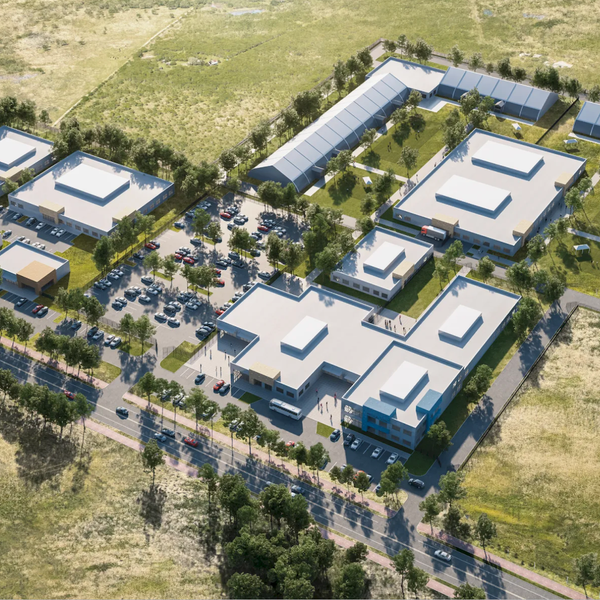We Must Degrow the 'Corporate Food Regime': Food Sovereignty Advocate
The industrial system in place has 'fetishized growth' but has not addressed hunger, according to Food First's Eric Holt-Giménez
It's necessary to "degrow" the "corporate food regime" that over last five decades has impoverished the climate, water resources, local communities and crop diversity, and has not solved the problem of hunger.
This was the argument made by Eric Holt-Gimenez, Executive Director of Food First, an organization whose mission is to work towards ending hunger by bringing about food justice, at a presentation Friday at the Fourth International Conference on Degrowth for Ecological Sustainability and Social Equity, which took place in Leipzig, Germany.
Holt-Gimenez made his address via video during a session entitled "The food challenge. Struggling for just and ecological food systems."
The food sector has been growth-focused, but this has not stopped the problem of hunger, Holt-Gimenez said, pointing the example of 2008, which was a year of record harvests and record profits for agricultural giants like Cargill and ADM amidst record hunger.
"Clearly, something has to change, and simply growing more food isn't going to solve the problem of hunger," he said. "This contradiction runs even deeper when we realize that most of the hungry people in the world are farmers. They're peasant farmers," most of whom are women, he added.
Yet "peasant farmers produce most of the food in the world -- and they do it on less than a quarter of the agricultural land on the planet."
"So there's a tremendous amount of inequity bound up in the food system which creates poverty and in turn creates hunger even in a world of abundance."
Yet institutions of power repeat the claim that the amount of food the wold produces must double by 2015, Holt-Gimenez said. "This is simply part of productivist ideology of an extractive and regressive food system -- regressive in that it does not redistribute the wealth within the food system, but it concentrates the wealth in fewer and fewer hands. "
Degrowth, however, has gripped the food system as well, he said, because as big farms are getting bigger, small farms are getting smaller. Despite this, small farms continue to be more productive than their bigger counterparts.
So what will it take for degrowth to occur in the right way in the food system? That will require food sovereignty, a system that is local, redistributive and adheres to agro-ecological principles, he said.
That's a food system that stands in contrast to the chemical-dependent system introduced in the so-called Green Revolution and trade policies like NAFTA, but is one that ensures access to land and an "end to corporate monopoly rule."
"Clearly, we need to degrow corporate power," he said. "Clearly, this means a complete transformation of the corporate food regime."
We need "reforms that transform" the current capitalist food system, and that will take alliance building between progressives and radicals to make a strong enough movement to bring about such reforms, he said.
To see Holt-Gimenez's full remarks as well as those by the other panelists, watch the video below uploaded by Rosa-Luxemburg-Stiftung:
The food challenge. Struggling for just and ecological food systemsDegrowth 2014, Day 4: «Visions and strategies for the transformation» 5.9.2014, 14:30h (recorded livestream) Speakers: Eric ...
An Urgent Message From Our Co-Founder
Dear Common Dreams reader, The U.S. is on a fast track to authoritarianism like nothing I've ever seen. Meanwhile, corporate news outlets are utterly capitulating to Trump, twisting their coverage to avoid drawing his ire while lining up to stuff cash in his pockets. That's why I believe that Common Dreams is doing the best and most consequential reporting that we've ever done. Our small but mighty team is a progressive reporting powerhouse, covering the news every day that the corporate media never will. Our mission has always been simple: To inform. To inspire. And to ignite change for the common good. Now here's the key piece that I want all our readers to understand: None of this would be possible without your financial support. That's not just some fundraising cliche. It's the absolute and literal truth. We don't accept corporate advertising and never will. We don't have a paywall because we don't think people should be blocked from critical news based on their ability to pay. Everything we do is funded by the donations of readers like you. Will you donate now to help power the nonprofit, independent reporting of Common Dreams? Thank you for being a vital member of our community. Together, we can keep independent journalism alive when it’s needed most. - Craig Brown, Co-founder |
It's necessary to "degrow" the "corporate food regime" that over last five decades has impoverished the climate, water resources, local communities and crop diversity, and has not solved the problem of hunger.
This was the argument made by Eric Holt-Gimenez, Executive Director of Food First, an organization whose mission is to work towards ending hunger by bringing about food justice, at a presentation Friday at the Fourth International Conference on Degrowth for Ecological Sustainability and Social Equity, which took place in Leipzig, Germany.
Holt-Gimenez made his address via video during a session entitled "The food challenge. Struggling for just and ecological food systems."
The food sector has been growth-focused, but this has not stopped the problem of hunger, Holt-Gimenez said, pointing the example of 2008, which was a year of record harvests and record profits for agricultural giants like Cargill and ADM amidst record hunger.
"Clearly, something has to change, and simply growing more food isn't going to solve the problem of hunger," he said. "This contradiction runs even deeper when we realize that most of the hungry people in the world are farmers. They're peasant farmers," most of whom are women, he added.
Yet "peasant farmers produce most of the food in the world -- and they do it on less than a quarter of the agricultural land on the planet."
"So there's a tremendous amount of inequity bound up in the food system which creates poverty and in turn creates hunger even in a world of abundance."
Yet institutions of power repeat the claim that the amount of food the wold produces must double by 2015, Holt-Gimenez said. "This is simply part of productivist ideology of an extractive and regressive food system -- regressive in that it does not redistribute the wealth within the food system, but it concentrates the wealth in fewer and fewer hands. "
Degrowth, however, has gripped the food system as well, he said, because as big farms are getting bigger, small farms are getting smaller. Despite this, small farms continue to be more productive than their bigger counterparts.
So what will it take for degrowth to occur in the right way in the food system? That will require food sovereignty, a system that is local, redistributive and adheres to agro-ecological principles, he said.
That's a food system that stands in contrast to the chemical-dependent system introduced in the so-called Green Revolution and trade policies like NAFTA, but is one that ensures access to land and an "end to corporate monopoly rule."
"Clearly, we need to degrow corporate power," he said. "Clearly, this means a complete transformation of the corporate food regime."
We need "reforms that transform" the current capitalist food system, and that will take alliance building between progressives and radicals to make a strong enough movement to bring about such reforms, he said.
To see Holt-Gimenez's full remarks as well as those by the other panelists, watch the video below uploaded by Rosa-Luxemburg-Stiftung:
The food challenge. Struggling for just and ecological food systemsDegrowth 2014, Day 4: «Visions and strategies for the transformation» 5.9.2014, 14:30h (recorded livestream) Speakers: Eric ...
It's necessary to "degrow" the "corporate food regime" that over last five decades has impoverished the climate, water resources, local communities and crop diversity, and has not solved the problem of hunger.
This was the argument made by Eric Holt-Gimenez, Executive Director of Food First, an organization whose mission is to work towards ending hunger by bringing about food justice, at a presentation Friday at the Fourth International Conference on Degrowth for Ecological Sustainability and Social Equity, which took place in Leipzig, Germany.
Holt-Gimenez made his address via video during a session entitled "The food challenge. Struggling for just and ecological food systems."
The food sector has been growth-focused, but this has not stopped the problem of hunger, Holt-Gimenez said, pointing the example of 2008, which was a year of record harvests and record profits for agricultural giants like Cargill and ADM amidst record hunger.
"Clearly, something has to change, and simply growing more food isn't going to solve the problem of hunger," he said. "This contradiction runs even deeper when we realize that most of the hungry people in the world are farmers. They're peasant farmers," most of whom are women, he added.
Yet "peasant farmers produce most of the food in the world -- and they do it on less than a quarter of the agricultural land on the planet."
"So there's a tremendous amount of inequity bound up in the food system which creates poverty and in turn creates hunger even in a world of abundance."
Yet institutions of power repeat the claim that the amount of food the wold produces must double by 2015, Holt-Gimenez said. "This is simply part of productivist ideology of an extractive and regressive food system -- regressive in that it does not redistribute the wealth within the food system, but it concentrates the wealth in fewer and fewer hands. "
Degrowth, however, has gripped the food system as well, he said, because as big farms are getting bigger, small farms are getting smaller. Despite this, small farms continue to be more productive than their bigger counterparts.
So what will it take for degrowth to occur in the right way in the food system? That will require food sovereignty, a system that is local, redistributive and adheres to agro-ecological principles, he said.
That's a food system that stands in contrast to the chemical-dependent system introduced in the so-called Green Revolution and trade policies like NAFTA, but is one that ensures access to land and an "end to corporate monopoly rule."
"Clearly, we need to degrow corporate power," he said. "Clearly, this means a complete transformation of the corporate food regime."
We need "reforms that transform" the current capitalist food system, and that will take alliance building between progressives and radicals to make a strong enough movement to bring about such reforms, he said.
To see Holt-Gimenez's full remarks as well as those by the other panelists, watch the video below uploaded by Rosa-Luxemburg-Stiftung:
The food challenge. Struggling for just and ecological food systemsDegrowth 2014, Day 4: «Visions and strategies for the transformation» 5.9.2014, 14:30h (recorded livestream) Speakers: Eric ...

